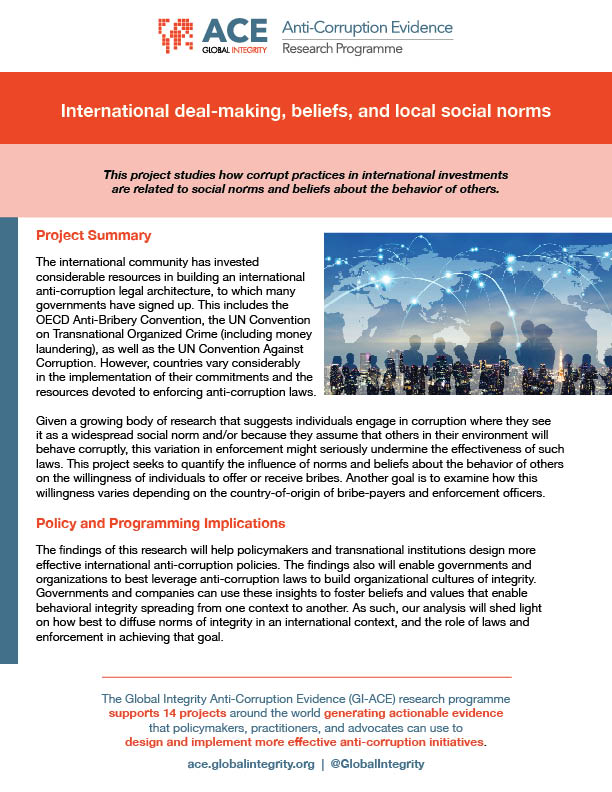International deal-making, beliefs, and local social norms
This project studies how corrupt practices in international investments are related to social norms and beliefs about the behavior of others.
Click here for the Project One-Pager
To learn more about this project, contact Principal Investigator Thorsten Chmura.
Project Summary
The international community has invested considerable resources in building an international anti-corruption legal architecture, to which many governments have signed up. This includes the OECD Anti-Bribery Convention, the UN Convention on Transnational Organized Crime (including money laundering), as well as the UN Convention Against Corruption. However, countries vary considerably in the implementation of their commitments and the resources devoted to enforcing anti-corruption laws.
Given a growing body of research that suggests individuals engage in corruption where they see it as a widespread social norm and/or because they assume that others in their environment will behave corruptly, this variation in enforcement might seriously undermine the effectiveness of such laws. This project seeks to quantify the influence of norms and beliefs about the behavior of others on the willingness of individuals to offer or receive bribes. Another goal is to examine how this willingness varies depending on the country-of-origin of bribe-payers and enforcement officers.
Policy and Programming Implications
The findings of this research will help policymakers and transnational institutions design more effective international anti-corruption policies. The findings also will enable governments and organizations to best leverage anti-corruption laws to build organizational cultures of integrity. Governments and companies can use these insights to foster beliefs and values that enable behavioral integrity spreading from one context to another. As such, our analysis will shed light on how best to diffuse norms of integrity in an international context, and the role of laws and enforcement in achieving that goal.
Research Questions
- How do participants in international deal-making weigh various considerations and accompanying trade-offs in regard to the well-being of their fellow countrymen and international partners?
- What do these participants in international deal-making believe about how their international partners will weigh considerations?
- What role, if any, do social norms play?
Methodology
Incentivized experiments have been designed by a multidisciplinary team involving economists, a political scientist, and advisory board representatives from business and law enforcement. The experiments will be conducted transnationally, so as to capture an essential aspect of the international business context in which many forms of corruption occur. To ensure external validity, participants will be recruited who are expected to become involved in international business in a professional capacity, either as officials in their country or working for investment firms. This experimental data will be compared to existing surveys on corruption.
This project will help to advance methodological debate in the field by demonstrating how experiments can optimally be used to complement other methods in the generation of policy-relevant insights. Such evidence is extremely important given that major investments in anti-bribery enforcement and compliance are being made by governments and by the private sector, and yet compliance procedures often fail on the ground.
Research Team Members
- Thorsten Chmura, Professor, Nottingham Trent University, Nottingham Business School
- Abigail Barr, Professor, University of Nottingham, School of Economics
- Elizabeth Dávid-Barrett, Professor, University of Sussex; Director of the Centre for the Study of Corruption
- Cormac Bryce, Senior Lecturer, City University of London, Cass Business School, Faculty of Actuarial Science and Insurance
- Marcus Giamattei, Professor, Bard College Berlin
- Theodore Alysandratos, Research Associate, Nottingham Trent University, Nottingham Business School





